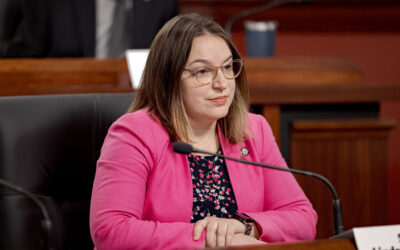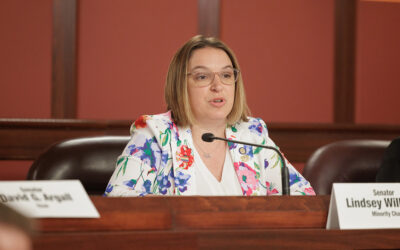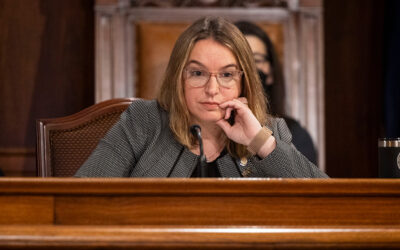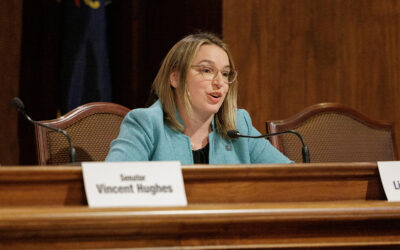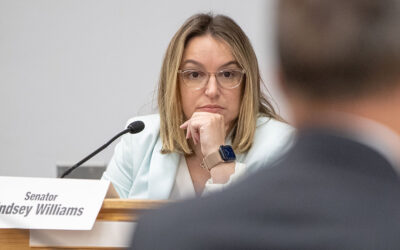Legislation I’m Working On
Senate Bill 1207 − Medical Emergency Response in Schools
In addition to preparing students for post-secondary career and life success, public schools also play a role in preparing students for adversity through fire, natural disaster, and security drills. While such drills better equip our children to respond to some emergencies, they do not prepare them for medical emergencies in which an adult is unresponsive or not present.
When a teacher has a medical emergency in the classroom and is unresponsive, or when the same happens to a student in the absence of an adult, school children currently do not have a protocol to ensure that these teachers or students get the help they need. In a medical emergency, when seconds count, having a plan in place to alert responsible individuals can mean the difference between life and death.
Recently, a student in my district brought this problem to my attention, prompted by her own experience. Working with her and other key stakeholders, I will be introducing legislation that would require schools to conduct annual medical emergency response drills to help our children gain developmentally-appropriate tools and practice in protocols, such as finding a classroom phone, contacting the school nurse, or otherwise alerting an adult that medical attention is needed.
Internship Stipends for School Counselors, Social Workers, Psychologists, and Nurses
This legislation would reduce the costs associated with become a certified school counselor, social worker, psychologist, or nurse in Pennsylvania schools.
At my recent Senate Democratic Policy Hearing on school staffing shortages, I heard testimony that school staff regularly juggle multiple jobs to pay down their debt – or too often, end up leaving the profession. I also heard about the desperate need for more school-based mental health professionals – something students regularly share with me as a top priority for them as well.
Unfortunately, for aspiring professional in these fields, it often costs more to work in schools than it does in other settings. For example, school psychologists must intern 1200 hours in schools while earning their degree. Other school-based mental health professionals have similar internship requirements. This on-the-ground training is vital preparation for working in schools but typically is unpaid and comes on top of other higher education expenses. We should be incentivizing these professionals to work in schools, not deterring them.
Based off a successful program in Ohio, my bill would enable districts to pay prospective school counselors, social workers, psychologists, and nurses a stipend during their internships. This will lower the barrier to becoming a school-based mental health professional and increase the number of caring adults in schools to support students now.
Student Loan Forgiveness for School-Based Mental Health Professionals
This bill would create a Student Loan Forgiveness Program that incentives individuals to pursue careers as certified school nurses, counselors, social workers, and psychologists in the Commonwealth.
At my recent Senate Democratic Policy Hearing on school staffing shortages, I heard testimony that school staff regularly juggle multiple jobs to pay down their debt – or too often, end up leaving the profession. I also heard about the desperate need for more school-based mental health professionals – something students regularly share with me as a top priority for them as well.
Student loans play a significant role in the financial lives of many educators. According to a 2020 National Education Association survey, nearly half of educators have taken out a student loan to fund their own education, with the average total amount standing at $55,800. Given the impact of institutional racism in financial institutions, housing, and employment, Black educators are even more likely to borrow and carry higher student debt.
Modeled after an existing program within the Department of Health, this bill will strengthen the pipeline of school-based mental health professionals by providing incentives for individuals to pursue higher education and careers as certified school nurses, counselors, social workers, and psychologists in the Commonwealth.
Given both the current crisis and longstanding challenges Pennsylvania faces in attracting and retaining school staff, it is my hope that by establishing this student loan forgiveness program, we can invest in the next generation of school-based mental health professionals that Pennsylvania desperately needs.
Latest News
Senator Lindsey M. Williams Applauds Senate Confirmation of Education Secretary Carrie Rowe
Harrisburg, Pa. − December 9, 2025 − Senator Lindsey M. Williams, Minority Chair of the Senate Education Committee, issues this statement following the Senate confirmation of the Honorable Carrie Rowe, Ed.D. as Secretary of Education: “I am excited to congratulate...
Senator Williams Joins Penn State Faculty Alliance for Union Election Announcement
Senator Lindsey M. Williams, Rep. Arvind Venkat, and Library Officials Celebrate Public Libraries and State Budget Increase
Pittsburgh, Pa. − December 9, 2025 − Senator Lindsey M. Williams (D-Allegheny) Representative Arvind Venkat (D-30), representatives from the Allegheny County Library Association, and Board Members and staff from the Northland Library gathered on Friday to...
Senator Lindsey M. Williams, Minority Chair of Senate Education Committee, Denounces Trump Administration’s Continued Attempts to Destroy Public Education
Pittsburgh, Pa. − November 19, 2025 − Senator Lindsey M. Williams, Minority Chair of the Senate Education Committee, issues this statement in response to yesterday’s announcement of the Trump Administration’s aggressive steps toward further dismantling the...
Senator Williams Advocates for Fully Funding Higher Ed
Senator Lindsey M. Williams Announces Legislation to Protect Students; Enforce Federal Education Laws
Harrisburg, Pa. − October 21, 2025 − Today, Senator Lindsey M. Williams (D-Allegheny), Minority Chair of the Senate Education Committee, announced that she will introduce legislation to create an Office of Civil Rights within the Pennsylvania Department of...
Senator Costa and Senator Williams Named Pennsylvania Library Association 2025 Elected Officials of the Year
Pittsburgh, PA — September 30, 2025 — In 2024, the Allegheny County Library Association (ACLA) and their 46 member libraries approached the 26 representatives and state senators who represent Allegheny County with a funding request for a project entitled “Providing...
Senator Lindsey M. Williams Issues Statement Criticizing Supreme Court Decision Allowing the Dismantling of Dept. of Education
Pittsburgh, PA − July 15, 2025 − Senator Lindsey M. Williams, Democratic Chair of the Senate Education Committee, issues this statement following yesterday’s Supreme Court decision allowing the Trump Administration to resume dismantling the Department of Education:...
Senators Lindsey M. Williams, Judy Schwank and Rep. Jeanne Mcneill Announce Legislation to Address Child Care Worker Shortage
Harrisburg, PA − May 5, 2025 − Today Senator Lindsey M. Williams (D-Allegheny), Senator Judy Schwank (D-Berks), and Rep. Jeanne McNeill (D-133) announced their intent to champion Governor Shapiro’s legislation to support working families across Pennsylvania by...
Senator Lindsey M. Williams Applauds Shapiro Administration’s Legal Challenge to Early Termination of Federal Education Funding
Pittsburgh, Pa. − April 10, 2025 − Senator Lindsey M. Williams, Democratic Chair of the Senate Education Committee, issued this statement following Governor Josh Shapiro’s announcement that he is suing the Trump Administration over the early termination of ESSER...
Senate Democratic Leader Jay Costa, Senate Democratic Education Chair Lindsey Williams Decry Dismantling of Federal Department of Education
PITTSBURGH, PA − March 20, 2025 − Today, President Trump is expected to sign an executive order which begins the process of dismantling the US Department of Education. In condemning this unconstitutional action, Senate Democratic Leader Jay Costa and Senate Democratic...
Senator Lindsey M. Williams’ Press Conference Remarks on Federal Attacks on the Department of Education
Harrisburg, PA − February 26, 2025 − This afternoon, Senate Democrats held a press conference in response to the U.S. House’s passage of a budget bill that proposes significant cuts to federal education funding and ongoing attacks to public...
Sen. Lindsey M. Williams’ Career and Technical Education Funding Bill Unanimously Passes Senate Education Committee
Harrisburg, Pa. − June 25, 2024 − Today, Senator Lindsey M. Williams’ Career and Technical Education Funding Bill passed the Senate Education Committee unanimously. Senate Bill 366 is co-prime sponsored by all six Senate members of the Basic Education Funding...
Senator Lindsey M. Williams Calls for Senate to Take Up House Education Funding Legislation
Pittsburgh, Pa. − June 12, 2024 − Senator Lindsey M. Williams, Minority Chair of the Senate Education Committee, is calling for the Senate to consider HB2370, landmark legislation that addresses the Commonwealth Court’s mandate to fully and constitutionally fund...
Sen. Lindsey Williams and Rep. Emily Kinkead Celebrate $509,600 Grant to West View HUB
Pittsburgh, Pa. − April 2, 2024 − Senator Lindsey M. Williams (D-Allegheny) and Representative Emily Kinkead (D-20) announced a $509,600 21st Century Community Learning Center (21st CCLC) grant to the West View HUB. The West View HUB has become a center of academic...
Senator Lindsey Williams Calls for Moratorium on Cyber Charter Schools in PA
Harrisburg, Pa. − February 28, 2024 − Following the Pennsylvania Department of Education (PDE) Senate Appropriations Hearing today, during which PDE struggled to meaningfully answer questions about the Department’s recent approval of a deficient cyber charter...
Sen. Lindsey Williams Releases Statement Following BEFC Vote Today
Harrisburg, Pa. − January 11, 2024 − Senator Lindsey M. Williams released this statement today, following her vote on the Basic Education Funding Commission Report. A full copy of the report, Senator Williams’ remarks, and all Commission hearings and materials...
Advocates who won Pa. education lawsuit call for a $2 billion ‘down payment’ on fair funding
Advocates who fought for and won a historic court ruling declaring Pennsylvania’s education funding system unconstitutional said Thursday that they’re ready to go back to court if state lawmakers and Gov. Josh Shapiro fail to make a significant down payment on a...
PA’s Biggest Tax Giveaway to Corporations and Wealthy Individuals Discriminates Against Children
Harrisburg, Pa. − December 13, 2023 − Senator Lindsey M. Williams, Minority Chair of the Senate Education Committee, voted against the 2023-24 School Code today because it continues to take tax dollars away from public education and instead funnels that money to...
Senator Lindsey Williams Denounces Senate Education Committee Vote on Book Ban Bill
Pittsburgh, Pa. − October 18, 2023 − Senator Lindsey M. Williams (D-Allegheny), Minority Chair of the Senate Education Committee, released this statement today, following a Senate Education Committee vote on the book ban bill, Senate Bill 7, which passed along party...




